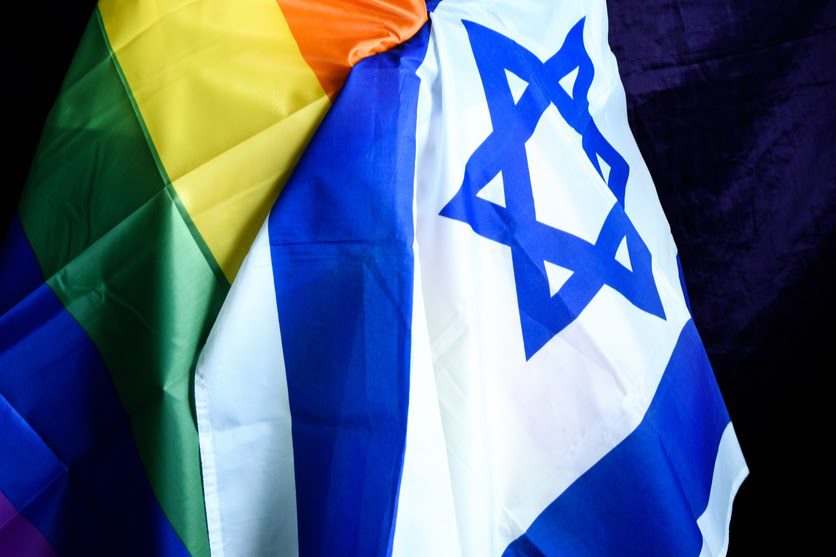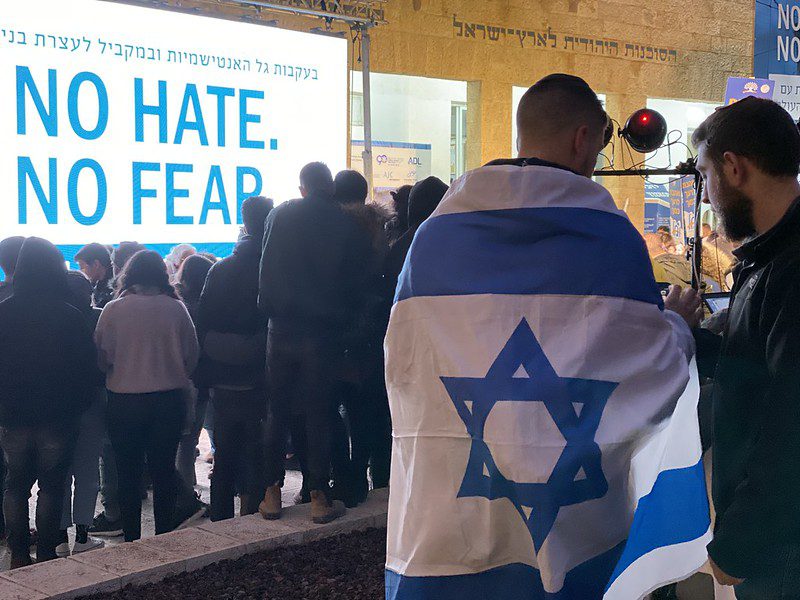By Rich Tenorio

Pride Month is a time to both mark the progress we have made in LGBTQIA+ rights and recommit to continuing the fight. The attacks against LGBTQIA+ people in legislatures and communities across the country, alongside rising antisemitism, remind us of the work ahead. For LGBTQIA+ Jews, the intersection of anti-LGBTQIA+ hate and antisemitism heightens fear and concern.
“There is absolutely a connection between antisemitism and anti-LGBTQIA+ hate,” Jay Smith, chief communications officer of the national Jewish LGBTQIA+ advocacy group Keshet, wrote in an email. “We see similar tropes and conspiracy theories around power, grooming and predators. Currently, we see that the same groups protesting drag shows and Pride events are those with white supremacist and antisemitic views.”
Last year, there were over 140 anti-LGBTQIA+ protests at drag events, with some protests also featuring antisemitic propaganda and signs, according to “Antisemitism & Anti-LGBTQ+ Hate Converge in Extremist and Conspiratorial Beliefs,” a January 2023 release from the Center on Extremism at the Anti-Defamation League that Smith referenced.
Gabriella Spitzer, a queer Jew who spoke at a Pride Shabbat at their hometown synagogue, Temple Israel of Sharon, voiced concern about queerphobia in Jamaica Plain, including vandalism at a local church and protests outside a drag story hour.
“The response to these incidents has been strong and interfaith, and I really appreciate some of the leadership of some of the local queer Christian clergy in speaking up against both anti-queer hatred and antisemitism,” said Spitzer, the author of a new Haggadah released this year, “Haggadah Min HaMeitzar: A Seder Journey to Liberation,” which they describe as traditional, queer and environmental.
“I’m very aware of the rise in Christian nationalism and white power and general fascist tendencies in this country,” Spitzer said. “And, more broadly, I am aware that whether the focus of the moment is queer folks or trans folks or Jews, it all comes from the same root of hatred and white supremacy and Christian supremacy.”
They cited a historical precedent—Magnus Hirschfeld, a Jewish German sexologist whose books were burned by the Nazis. Hirschfeld was included in an anti-trans section of a manifesto written by the perpetrator of a mass shooting at a Buffalo supermarket in May 2022.
“I wish [Hirschfeld] was a story I learned in Jewish day school, not as an adult,” Spitzer said. “But it is a very important story to me, and in thinking about how fragile progress can be, how much, how far back the Nazis could put the world…only in the last couple decades are we back to where Magnus Hirschfeld was 100 years ago. And I think it’s an important point in thinking about how these kinds of hatreds are connected, and have been, and there’s nothing new about that connection. It’s old, and deeply felt in a lot of places.”
Most individuals interviewed for this article expressed particular concern about a right-wing convergence of anti-LGBTQIA+ hate and antisemitism—among white supremacists in particular. In addition, the ADL release from January cited multiple reports of such convergence.
“Hate groups view both Jews and LGBTQ+ people as a threat to Christian supremacy,” Smith said. “For centuries, antisemites have propagated conspiracy beliefs that Jews are undermining society and responsible for any unwanted changes in attitudes or social structures. Today, those lies are being told about LGBTQ+ people as well. These beliefs are extreme and dangerous, and the threats we face are real. As LGBTQ+ Jews, our lives and communities are at increased risk for violence.”
One interviewee, Southern Connecticut State University English professor Corinne Blackmer, noted a convergence in homophobia and antisemitism on the left. Blackmer, a self-described Jewish lesbian feminist, experienced it personally in 2009, during the Gaza War between Israel and Hamas. She reported that her office door was vandalized with antisemitic, homophobic and anti-Zionist graffiti.
“I’m not scared of my identity,” Blackmer said. “I put it on my office door. Really hateful comments were made.”
According to Blackmer, when she was about to call the campus police, she found a threatening homophobic and anti-Zionist voice message. She followed through on notifying the campus police, who called in the New Haven police as a backup. The local media covered the story—albeit not in the way she had hoped.
“[They] were perfectly willing to talk about this as an anti-gay attack, but very reluctant to talk about the anti-Zionism,” Blackmer said. “I continued to stress this was anti-Zionist. It really was, and also antisemitic.”
She described further harassment—mud was daubed on her car, and there was another threatening voice message. She also said she was upset when a colleague attributed the attacks to a homophobic patriarchy but did not mention the anti-Zionist aspect.
Blackmer went on to travel to Israel in 2016 through a grant from the Schusterman Center for Israel Studies at Brandeis University and met with Israelis and Palestinians, including gay Palestinians whom she said have a difficult time on both sides of the Green Line. More recently, she published a book, “Queering Anti-Zionism: Academic Freedom, LGBTQ Intellectuals, and Israel/Palestine Campus Activism.”
“The book has been doing very well,” she said. “There’s been a lot of interest in it…Either I could hide away [and] avoid these issues, or take them head-on. I decided to take them head-on.”
Rich Tenorio covers antisemitism news for JewishBoston.com. His work has appeared in international, national, regional and local media outlets. He is a graduate of Harvard College and the Columbia University Graduate School of Journalism. He is also a cartoonist. Email him at rich@jewishboston.com.




